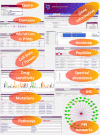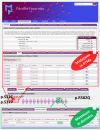Colorectal cancer atlas: An integrative resource for genomic and proteomic annotations from colorectal cancer cell lines and tissues - PubMed (original) (raw)
. 2016 Jan 4;44(D1):D969-74.
doi: 10.1093/nar/gkv1097. Epub 2015 Oct 22.
Shivakumar Keerthikumar 2, Mohashin Pathan 2, Dinuka Ariyaratne 2, Hina Kalra 2, Stephanie Boukouris 2, Nidhi Abraham Mathew 2, Haidar Al Saffar 2, Lahiru Gangoda 2, Ching-Seng Ang 3, Oliver M Sieber 4, John M Mariadason 5, Ramanuj Dasgupta 6, Naveen Chilamkurti 1, Suresh Mathivanan 7
Affiliations
- PMID: 26496946
- PMCID: PMC4702801
- DOI: 10.1093/nar/gkv1097
Colorectal cancer atlas: An integrative resource for genomic and proteomic annotations from colorectal cancer cell lines and tissues
David Chisanga et al. Nucleic Acids Res. 2016.
Abstract
In order to advance our understanding of colorectal cancer (CRC) development and progression, biomedical researchers have generated large amounts of OMICS data from CRC patient samples and representative cell lines. However, these data are deposited in various repositories or in supplementary tables. A database which integrates data from heterogeneous resources and enables analysis of the multidimensional data sets, specifically pertaining to CRC is currently lacking. Here, we have developed Colorectal Cancer Atlas (http://www.colonatlas.org), an integrated web-based resource that catalogues the genomic and proteomic annotations identified in CRC tissues and cell lines. The data catalogued to-date include sequence variations as well as quantitative and non-quantitative protein expression data. The database enables the analysis of these data in the context of signaling pathways, protein-protein interactions, Gene Ontology terms, protein domains and post-translational modifications. Currently, Colorectal Cancer Atlas contains data for >13 711 CRC tissues, >165 CRC cell lines, 62 251 protein identifications, >8.3 million MS/MS spectra, >18 410 genes with sequence variations (404 278 entries) and 351 pathways with sequence variants. Overall, Colorectal Cancer Atlas has been designed to serve as a central resource to facilitate research in CRC.
© The Author(s) 2015. Published by Oxford University Press on behalf of Nucleic Acids Research.
Figures
Figure 1.
Snapshot of Colorectal Cancer Atlas features. An overview of proteomic and genomic data features for APC gene is displayed. A user can query the database using a gene symbol or a protein name. A gene information page will provide the users with details pertaining to protein domains, post-translational modifications (PTM), reported mutations in cell lines/tissues, quantitative protein expression, pathway, protein–protein interaction (PPI) and cell line drug sensitivity.
Figure 2.
PTMs and domains in β-catenin are affected due to mutation. Snapshot of β-catenin molecular page is displayed. The PTMs affected by mutations can be viewed in the tab PTMs. Mutations in β-catenin at positions important for phosphorylation (S33, S37, T41 and S45) allows for the stabilization of β-catenin and constitutive activation of the Wnt signaling pathway. The upstream kinases responsible for the phosphorylation is also provided along with the literature reference. Likewise, mutations in the armadillo domain can be viewed by correlating the sequence variants and the domain span regions. For example, mutations in the armadillo domain (p.R582) in β-catenin have been described which have been reported to alter the binding of β-catenin to TCF4 (24).
Similar articles
- Multi-omics of 34 colorectal cancer cell lines - a resource for biomedical studies.
Berg KCG, Eide PW, Eilertsen IA, Johannessen B, Bruun J, Danielsen SA, Bjørnslett M, Meza-Zepeda LA, Eknæs M, Lind GE, Myklebost O, Skotheim RI, Sveen A, Lothe RA. Berg KCG, et al. Mol Cancer. 2017 Jul 6;16(1):116. doi: 10.1186/s12943-017-0691-y. Mol Cancer. 2017. PMID: 28683746 Free PMC article. - Empowering biologists with multi-omics data: colorectal cancer as a paradigm.
Zhu J, Shi Z, Wang J, Zhang B. Zhu J, et al. Bioinformatics. 2015 May 1;31(9):1436-43. doi: 10.1093/bioinformatics/btu834. Epub 2014 Dec 18. Bioinformatics. 2015. PMID: 25527095 Free PMC article. - Colorectal Cancer Cell Line Proteomes Are Representative of Primary Tumors and Predict Drug Sensitivity.
Wang J, Mouradov D, Wang X, Jorissen RN, Chambers MC, Zimmerman LJ, Vasaikar S, Love CG, Li S, Lowes K, Leuchowius KJ, Jousset H, Weinstock J, Yau C, Mariadason J, Shi Z, Ban Y, Chen X, Coffey RJC, Slebos RJC, Burgess AW, Liebler DC, Zhang B, Sieber OM. Wang J, et al. Gastroenterology. 2017 Oct;153(4):1082-1095. doi: 10.1053/j.gastro.2017.06.008. Epub 2017 Jun 16. Gastroenterology. 2017. PMID: 28625833 Free PMC article. - Quantitative mass spectrometry for colorectal cancer proteomics.
Martínez-Aguilar J, Chik J, Nicholson J, Semaan C, McKay MJ, Molloy MP. Martínez-Aguilar J, et al. Proteomics Clin Appl. 2013 Jan;7(1-2):42-54. doi: 10.1002/prca.201200080. Proteomics Clin Appl. 2013. PMID: 23027722 Review. - Expression and functional proteomics studies in colorectal cancer.
Reymond MA, Steinert R, Kähne T, Sagynaliev E, Allal AS, Lippert H. Reymond MA, et al. Pathol Res Pract. 2004;200(2):119-27. doi: 10.1016/j.prp.2004.02.001. Pathol Res Pract. 2004. PMID: 15237920 Review.
Cited by
- Identification of cancer risk lncRNAs and cancer risk pathways regulated by cancer risk lncRNAs based on genome sequencing data in human cancers.
Li Y, Li W, Liang B, Li L, Wang L, Huang H, Guo S, Wang Y, He Y, Chen L, He W. Li Y, et al. Sci Rep. 2016 Dec 19;6:39294. doi: 10.1038/srep39294. Sci Rep. 2016. PMID: 27991568 Free PMC article. - A network view of microRNA and gene interactions in different pathological stages of colon cancer.
Wen J, Hall B, Shi X. Wen J, et al. BMC Med Genomics. 2019 Dec 30;12(Suppl 7):158. doi: 10.1186/s12920-019-0597-1. BMC Med Genomics. 2019. PMID: 31888617 Free PMC article. - Somatic APC mosaicism and oligogenic inheritance in genetically unsolved colorectal adenomatous polyposis patients.
Ciavarella M, Miccoli S, Prossomariti A, Pippucci T, Bonora E, Buscherini F, Palombo F, Zuntini R, Balbi T, Ceccarelli C, Bazzoli F, Ricciardiello L, Turchetti D, Piazzi G. Ciavarella M, et al. Eur J Hum Genet. 2018 Mar;26(3):387-395. doi: 10.1038/s41431-017-0086-y. Epub 2018 Jan 24. Eur J Hum Genet. 2018. PMID: 29367705 Free PMC article. - Application of open-access databases to determine functional connectivity between resveratrol-binding protein QR2 and colorectal carcinoma.
Doonan BB, Schaafsma E, Pinto JT, Wu JM, Hsieh TC. Doonan BB, et al. In Vitro Cell Dev Biol Anim. 2017 Aug;53(7):575-578. doi: 10.1007/s11626-017-0174-x. Epub 2017 Jun 23. In Vitro Cell Dev Biol Anim. 2017. PMID: 28646291
References
- Jemal A., Bray F., Center M.M., Ferlay J., Ward E., Forman D. Global cancer statistics. CA Cancer J. Clin. 2011;61:69–90. - PubMed
Publication types
MeSH terms
LinkOut - more resources
Full Text Sources
Other Literature Sources
Medical

